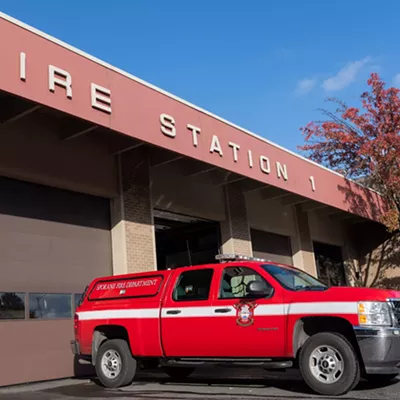A few weeks back, as I watched the proceedings down at the special City Council hearing on the garage issue and its attendant litigation, and as I followed the very detailed and often arcane legalistic testimony being offered, my mind wandered. I found myself thinking about what three of my out-of-town freshman political science students had recently said of impressions they had of Spokane. One young woman from near Boise, when I asked what differences she saw in the two cities, said without hesitation that Boise wouldn't want a mall downtown. Malls are for the suburbs, she said. A student from Salt Lake City told me that before coming to Spokane, she had never seen poverty of the depth we have here. Another, from the Puget Sound area, observed that to him Spokane seemed just kind of shabby.
Out of the mouths of babes.
Then I recalled what former Seattle mayor Charlie Royer had to say about the deal that Boston mayor Kevin White made years ago on a handshake with a local developer. The deal would restore and enhance the old, run-down Quincy Market, now one of Boston's great attractions. "Today, Kevin would probably go to jail for making that deal," Royer once said. But with the success enjoyed by the market, does any Bostonian care now, three decades later? Most Beantowners simply remember White as a mayor who got things done.
As testimony continued, I recalled the debates in Maryland over how to finance what would become the model for all the "new-old" baseball stadiums, Camden Yards. One state senator charged that Baltimore Orioles owner Edward Bennett Williams was holding the city hostage because he "wants to make every cent possible."
That sounds familiar, I thought.
A mall downtown? Could it be that my student reconfirmed what we have always known, that the River Park Square operation was a defensive move at best, just as our many skywalks were three decades earlier? Had my student, innocently enough, reminded me that healthy downtowns don't need to do skywalks or malls?
And what about economic malaise? To a couple of eighteen-year-olds new in town, the problem fairly leaps out at them. Is this a problem that I no longer see clearly because, unlike these kids, I've been looking at it for far too long?
Then I thought of the mayor's upcoming poverty summit and was struck by how all the goings-on at the Council meeting make literally zero contribution to the challenges surrounding the poverty issue.
Quincy Market? Camden Yards? I asked myself, how would either of these projects, now widely beloved, hold up under the criticism directed at the garage project? I dare say neither would look good. I thought of Maryland Governor William Donald Schaefer, who greased the skids for millionaire Orioles owner Williams. I'd bet my house that more than a few open-meetings laws were broken along the way in that deal. And let's not even talk about the public subsidizing of a largely private project. I could just imagine Schaeffer and Williams trying to explain themselves to critics in Spokane.
In his recent book, Warrior Politics, Robert Kaplan points out that Machiavelli argued that decisions should be judged as virtuous only if they succeed -- only if they prove to be effective. Applying that logic to the downtown mall, we ask: Is River Park Square our Quincy Market, our Camden Yards, or even our Safeco Field? Does it make our city less shabby? Does it serve as a partial remedy to poverty? Claims about saving the downtown aside, we face many open questions, some of which will not be answered until more time passes. No doubt the mall has stirred development -- but what about commercial doings outside the mall? Once inside the mall, do shoppers spend dollars elsewhere? Perhaps healthy downtowns need the kind of variety that Spokane hasn't enjoyed since the old Crescent closed. And about street life -- is it just my imagination or is our street life at an all-time low?
Put another way, as my student implied, a successful mall may not necessarily create a successful downtown. Then again, not having a mall could make a struggling downtown struggle even harder. But if we aren't succeeding, then no number of open meetings, no unraveling of "the deal," no demands that a deal be considered a deal, no amount of legal posturing, nor exposure of real or imagined conspiracies, nor chest-beating about accountability -- if the project is ineffective, then none of this can save the deal, nor the developer, nor the city.
On the other hand, if it is true that downtown is being saved because of the mall -- if that decision proves to be effective, as Quincy Market or Camden Yards have been judged -- then Machiavelli would urge us to take a deep breath, cut a fiscally equitable arrangement, get a life, forget all about style points and move on.
Thoughts? Comments?
Share them at robert@inlander.com.

















